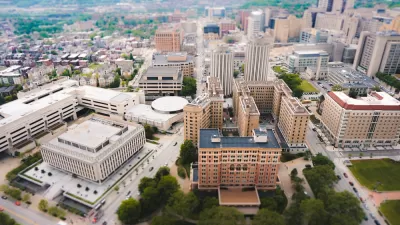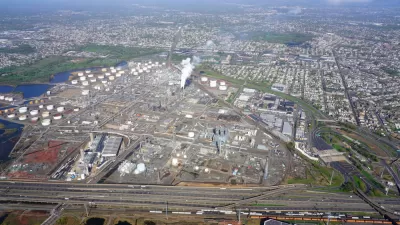A new analysis of developer-initiated rezonings in Louisville, Kentucky sheds light on how the land use regulation system works.

Zoning amendments in Louisville, Kentucky are more likely to reflect wealthy neighborhoods, according to new research from the Urban Institute.
In the article linked below, Lydia Lo and Yonah Freemark present the finds of a recent study that examined a new dataset of all rezoning applications from 2010 to 2020 in the combined Louisville–Jefferson County jurisdiction (Metro). For those who might not be familiar with the Louisville region, that means the dataset covers the merged city-county government and several other incorporated municipalities. The researchers also researched alongside Metro’s ongoing racial equity review of its zoning code and processes.
“[T]he system as a whole—including the housing market and the rezoning approval process—advantages wealthy neighborhoods in the process of managing development,” according to the article. “Developer interest in investment— indicated by the number of building permits and rezoning applications—centers on wealthier, more expensive neighborhoods in Louisville,” and local governments approve most of the zoning amendments they encounter, but at differing rates based on the neighborhoods where they are proposed.
More findings from the evaluation, and a link to the full report, can be found below.
FULL STORY: Influencers, Bias, and Equity in Rezoning Cases

Alabama: Trump Terminates Settlements for Black Communities Harmed By Raw Sewage
Trump deemed the landmark civil rights agreement “illegal DEI and environmental justice policy.”

Planetizen Federal Action Tracker
A weekly monitor of how Trump’s orders and actions are impacting planners and planning in America.

Why Should We Subsidize Public Transportation?
Many public transit agencies face financial stress due to rising costs, declining fare revenue, and declining subsidies. Transit advocates must provide a strong business case for increasing public transit funding.

Understanding Road Diets
An explainer from Momentum highlights the advantages of reducing vehicle lanes in favor of more bike, transit, and pedestrian infrastructure.

New California Law Regulates Warehouse Pollution
A new law tightens building and emissions regulations for large distribution warehouses to mitigate air pollution and traffic in surrounding communities.

Phoenix Announces Opening Date for Light Rail Extension
The South Central extension will connect South Phoenix to downtown and other major hubs starting on June 7.
Urban Design for Planners 1: Software Tools
This six-course series explores essential urban design concepts using open source software and equips planners with the tools they need to participate fully in the urban design process.
Planning for Universal Design
Learn the tools for implementing Universal Design in planning regulations.
Caltrans
Smith Gee Studio
Institute for Housing and Urban Development Studies (IHS)
City of Grandview
Harvard GSD Executive Education
Toledo-Lucas County Plan Commissions
Salt Lake City
NYU Wagner Graduate School of Public Service





























